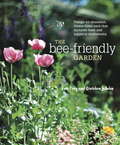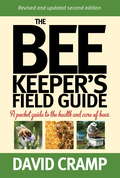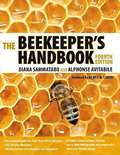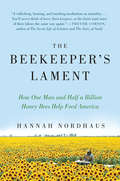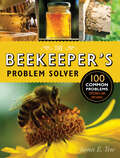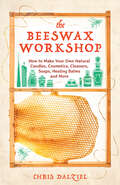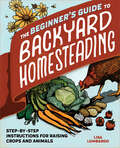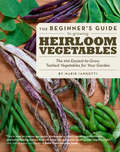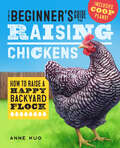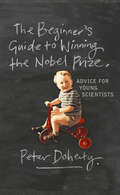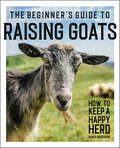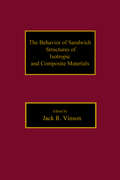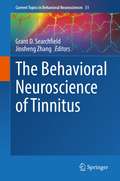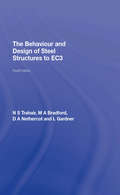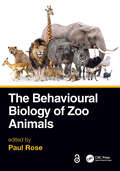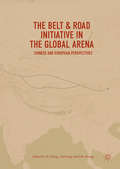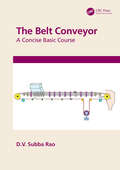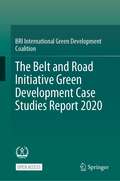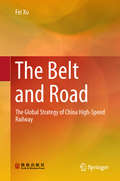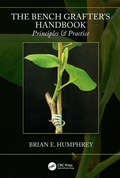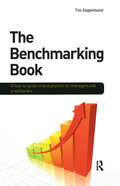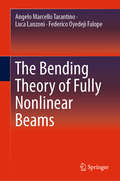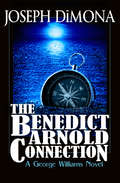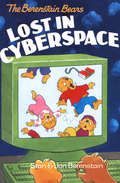- Table View
- List View
The Bee-Friendly Garden
by Gretchen Lebuhn Kate FreyThis guide to designing a bee garden helps gardeners create a stunningly colorful, vibrant, healthy habitat that attracts both honeybees and native bees. In The Bee-Friendly Garden, award-winning garden designer Kate Frey and bee expert Gretchen LeBuhn provide everything you need to know to create a stunningly colorful, vibrant, safe, healthy garden that helps both the threatened honeybee and native bees. No matter how small or large your space, and regardless of whether you live in the city, suburbs, or country, just a few simple changes to your garden can fight the effects of colony collapse disorder and the worldwide decline in bee population that threatens our global food chain. There are many personal benefits of having a bee garden as well! Bee gardens: · contain a gorgeous variety of flowers · bloom continuously throughout the seasons · are organic, pesticide-free, and ecologically sustainable · develop healthy and fertile soil · attract birds, butterflies, and other beneficial insects · increase the quantity of your fruit and vegetable harvest · improve the quality, flavor, and size of your produce Illustrated with spectacular full-color photos, The Bee-Friendly Garden debunks myths about bees, explains seasonal flower progression, and provides detailed instructions for nest boxes and water features. From "super blooming" flowers to regional plant lists and plants to avoid, The Bee-Friendly Garden is an essential tool for every gardener who cares about the planet and wants to make their yard a welcoming habitat for nature's most productive pollinator.From the Trade Paperback edition.
The Beekeeper's Field Guide: A Pocket Guide to the Health and Care of Bees
by David CrampThis guide is a diagnostic tool and an aide memoire for the hobbyist and for the professional beekeeper, who may know what to do but will at times need the information close to hand. It includes: - A troubleshooting guide to problems with colonies and queen bees - A guide to the field diagnosis, treatment and control of diseases - Seasonal apiary management checklists - Hive product harvesting checklists - The beekeeper's ready reckoner The second and revised edition of this fully illustrated and handy guide to the apiary brings the science and craft of beekeeping to beekeepers right where they need it - in the field with the bees.Contents: Preface; List of figures; List of photographs; List of tables; Picture credits; Introduction; Part A: Setting up an Apiary; Part B: Crops, Trees and Plants for Bees; Part C: Troubleshooting Guide to Field Operations; Part D: Swarm Prevention and Control; Part E: Queen Bees; Part F: Honey Harvest Procedures; Part G: Hive Checks; Part H: Pests and Diseases; Part I: A Beekeeper's Ready-reckoner; Part J.
The Beekeeper's Handbook
by Diana Sammataro Alphonse Avitabile Dewey M. CaronSince 1973, tens of thousands of first-time and experienced beekeepers alike have relied on The Beekeeper's Handbook as the best single-volume guide to the hobby and profession of beekeeping. Featuring clear descriptions and authoritative content, this handbook provides step-by-step directions accompanied by more than 100 illustrations for setting up an apiary, handling bees, and working throughout the season to maintain a healthy colony of bees and a generous supply of honey. This book explains the various colony care options and techniques, noting advantages and disadvantages, so that beekeepers can make the best choices for their own hives. This fourth edition has been thoroughly redesigned, expanded, updated, and revised to incorporate the latest information on Colony Collapse Disorder, green IPM methods, regional overwintering protocols, and procedures for handling bees and managing diseases and pests such as African honey bees and bee mites. The book explains not only how but also why each step is part of the transformative process that results in the magnificent creation of honey. This essential guide is a beekeeper's most valuable resource. Colony Collapse Disorder has renewed our recognition of the importance of small-scale beekeeping and the critical role of bees in the production of our food supply. For the growing number of beekeepers looking to set up hives for either a rewarding hobby or a profitable commercial enterprise, this updated and revised essential how-to guide includes: - step-by-step directions for all stages from setting up an apiary to harvesting honey; - approximately 100 illustrations featuring techniques, equipment, and bee biology; - information about how to manage new pests and diseases including Colony Collapse Disorder; - coverage of new trends and changes in beekeeping including green IPM techniques and new laws for urban beekeeping; - the most up-to-date bibliography and list of resources on the topic; and - a new user-friendly book design that clearly highlights instructions and other important features.
The Beekeeper's Handbook (3rd edition)
by Diana Sammataro Alphonse AvitabileDiana Sammataro and Alphonse Avitabile have revised and expanded their clear and comprehensive guide to cover changes in beekeeping. They discuss the crisis created by the parasitic bee mites. In less than a decade, for example, Varroa mites have saturated the North American honeybee population with disastrous results, devastating both managed and wild populations. The new edition of The Beekeeper's Handbook covers mite detection and control as well as the selection and testing of bees that may have some tolerance to mites.
The Beekeeper's Lament: How One Man and Half a Billion Honey Bees Help Feed America
by Hannah Nordhaus“A crackerjack story of one American beekeeper’s days . . . presented within the context of beekeeping’s natural and social history” (Kirkus, starred review).“A rollicking, buzzing, and touching meditation on mortality. . . . You’ll never think of bees, their keeper, or the fruits (and nuts) of their labors the same way again.” —Trevor Corson, author of The Secret Life of Lobsters and The Story of SushiThe honey bee is a willing conscript, a working wonder, an unseen and crucial link in America’s agricultural industry. But never before has its survival been so unclear—and the future of our food supply so acutely challenged.Enter beekeeper John Miller, who trucks his hives around the country, bringing millions of bees to farmers otherwise bereft of natural pollinators. Even as the mysterious and deadly epidemic known as Colony Collapse Disorder devastates bee populations across the globe, Miller forges ahead with the determination and wry humor of a true homespun hero. The Beekeeper’s Lament tells his story and that of his bees, making for a complex, moving, and unforgettable portrait of man in the new natural world.“I loved The Beekeeper’s Lament. With great reporting and great writing, Hannah Nordhaus gives a new angle on an ever-evolving topic. You’ll learn a lot.” —Bernd Heinrich, author of Winter World and Mind of the Raven“An engaging account of the men and insects who put food on our tables. The Beekeeper’s Lament is a sweet, sad story.” —Elizabeth Kolbert, author of Field Notes from a Catastrophe
The Beekeeper's Problem Solver: 100 Common Problems Explored and Explained
by James E. TewAuthor, experienced beekeeper, and apiary expect James E. Tew explains 100 common problems faced by beekeepers, clearly spelling out their underlying causes and how to solve all of them.Beekeeping requires understanding, commitment, and attention to detail. Laying the groundwork for a successful hive is essential, and demands a keen appreciation of critical areas like hive management, breed choice, and health requirements.Bees often disguise problems, though, making recognizing trouble in the crucial, initial stages that much more difficult. Whether you’re a newcomer or an old hand, The Beekeeper’s Problem Solver provides the information you need to nip problems in the bud, or avoid them in the first place.With color photography throughout and a glossary of terms at the back, each beekeeping problem is tackled in depth, covering a wide range of practical tips and useful insights. The problems are conveniently organized into the following categories: ·Beekeeping Basics – My new bees arrived during a cool, rainy period. … ·Beekeeping Equipment – The beehive smoker will not stay lit. … ·Biology and Behavior of the Colony – There are many dead drones at the hive entrance. … ·Managing and Manipulating Hives – The brood nest has been built across multiple boxes. … ·Queen Production and Maintenance – The queen is not a good egg producer. … ·Diseases and Pests of Honey Bees – Varroa mites have overrun the colony. … ·Pollen and Pollination – Too few bees are pollinating the target crop. … ·Producing and Processing Honey – The honey filter keeps getting clogged. … ·Beeswax, Propolis, and Specialty Issues – Propolis is difficult to gather and process. … Don’t lose your hive to something preventable, just grab your problem solver!
The Beeswax Workshop: How to Make Your Own Natural Candles, Cosmetics, Cleaners, Soaps, Healing Balms and More
by Christine J. DalzielOver 100 recipes to transform this miracle ingredient into environmentally friendly household cleaner, personal care products, candles, and more.Making all kinds of amazing, all-natural stuff out of beeswax is easy and fun. Packed with over 100 step-by-step recipes, The Beeswax Workshop shows you how to make beautiful gifts, household cleaners, beauty supplies and so, so much more. Projects in this book include:HOME• Mason Jar Candle• English Furniture PolishHEALTH• Bug-Be-Gone Insect Repellent• Chamomile Sunburn SalveBEAUTY• Everyday Body Butter• Rose Lip GlossGARDEN• Waterproof Shade Hat• Nontoxic Wood SealantWhether you use beeswax from your backyard hive or purchase a supply, this book offers tips, tricks and techniques for getting the most out of this miracle ingredient.
The Beginner's Guide to Backyard Homesteading: Step-by-Step Instructions for Raising Crops and Animals
by Lisa LombardoFarm to table takes on new meaning with this comprehensive beginner's guide to creating a backyard homestead. Learn how to convert your yard into a sustainable and self-reliant space that reduces waste and puts food on your plate. Filled with practical advice and straightforward lessons, you'll soon see how feasible it is to keep poultry or can fruit you've grown. Whether you have a tiny plot or a large estate, The Beginner's Guide to Backyard Homesteading demonstrates that anyone can start living off their land. This homesteading book offers up indispensable tips and tricks, including: Project action plans—Kick-starting your homesteading journey is a breeze with action plans that help you break down necessary materials, project costs, monthly goals, and more. Seasonal timelines—Knowing what to plant and when is crucial to your success. These precise timelines reveal the ideal schedules for everything from starting seedlings to harvesting honey. Exhaustive instructions—Learn how to build the infrastructure you need with easy-to-follow directions. You'll find yourself constructing raised beds and planting fruit trees in no time. Jump into a more sustainable, affordable, and fulfilling lifestyle with The Beginner's Guide to Backyard Homesteading.
The Beginner's Guide to Growing Heirloom Vegetables: The 100 Easiest-to-Grow, Tastiest Vegetables for Your Garden
by Marie IannottiGrowing your own vegetables has never looked, or tasted, so good. Are heirloom vegetables more difficult to grow than conventional hybrids? The Beginner's Guide to Growing Heirloom Vegetables debunks this myth by highlighting the 100 heirloom vegetables that are the easiest to grow and the tastiest to eat.Marie Iannotti makes it simple for beginning gardeners to jump on the heirloom trend by presenting an edited list based on years of gardening trial and error. Her plant criteria is threefold: The 100 plants must be amazing to eat, bring something unique to the table, and—most importantly—they have to be unfussy and easy to grow. Her list includes garden favorites like the meaty and mellow 'Lacinato' Kale, the underused and earthy 'Turkish Orange' Eggplant, and the unexpected sweetness of 'Apollo' Arugula.
The Beginner's Guide to Raising Chickens: How to Raise a Happy Backyard Flock
by Anne KuoThe beginner's complete guide raising happy backyard chickens—your new summer activity!The Beginner's Guide to Raising Chickens makes it easy to start keeping these surprisingly smart birds right in your own backyard. From constructing coops to rearing chicks, you'll learn everything you need to know to make sure your chickens stay happy and healthy all year round.Which breed of chicken is right for you? What's the best bedding material? What sort of feed should you use? Expert chicken keeper Anne Kuo answers these questions—and many others—in this fun and friendly reference book that will get you excited to raise your new feathered friends.This book on raising chickens guides you through:Getting from the chicken to the egg—Find out how to raise chicks, keep your birds safe from predators, introduce new birds to the flock, and more.Creating a custom coop—Build the perfect home for raising chickens with detailed backyard coop construction guides.Expert care advice—Learn how to identify different behaviors in your chicken, help solve egg shortages, and navigate a range of potential surprises with confidence.Start the perfect summer hobby when you grab the The Beginner's Guide to Raising Chickens.
The Beginner's Guide to Winning the Nobel Prize: Advice for Young Scientists
by Peter DohertyThe Nobel Prize-winning medical researcher recounts his unlikely career journey in a memoir that &“opens the vault to the world of science&” (Nature). Beginning with his humble origins in Australia, Peter Doherty tells how he developed an interest in immunology and describes his award-winning, influential work with Rolf Zinkernagel on T-cells and the nature of immune defense. In prose that is both amusing and astute, Doherty reveals how his nonconformist upbringing and search for different perspectives have shaped his life and work. Doherty offers an insider's look at the life of a research scientist. He lucidly explains his own scientific work and how research projects are selected, funded, and organized; the major problems science is trying to solve; and the rewards and pitfalls of a career in scientific research. He also explores the stories of past Nobel winners and considers some of the crucial scientific debates of our time, including the safety of genetically modified foods and the tensions between science and religion. He concludes with some "tips" on how to win a Nobel Prize, including advice on being persistent, generous, and culturally aware.
The Beginner’s Guide to Raising Goats: How to Keep A Happy Herd
by Amber BradshawMake bucks (and plenty of kids) by raising goats.Whether you're looking to be self-sufficient, or you want to make some money on the side, goats are perfect for milk and cheese, meat, and fiber. Taking care of goats could be your newest summer activity. The Beginner's Guide to Raising Goats can help you get the most out of these hearty herd animals with step-by-step instructions and easy-to-follow tips for newcomers.From Angoras to Nigerian Dwarfs, this beginner's guide to raising goats will break down the dos and don'ts to starting your herd. Learn how to pick the right kind of goat for your homestead's needs, build fences and shelters, feed and breed them, and more. Raising goats can be a wonderful adventure in family fun this summer, that not only teaches valuable life skills to the younger ones but also delivers a valuable resource to your table. There's even a recipe section in the back that shows you how to use their fresh meat and milk to make tasty home-cooked meals like Goat Chili and Goat Mac N' Cheese.The Beginner's Guide to Raising Goats features:Goats 101—Discover an in-depth overview that gives you everything you need to know about raising goats.Share your bounty—Explore practical tips that show you how to start a side business selling goat milk, cheese, and meat.Dollars & sense—Get a cost estimate and approximate timelines for raising animals, making dairy products, and selling them for profit.Learn how goats can help create a more sustainable life with this essential beginner's guide.
The Behavior of Sandwich Structures of Isotropic and Composite Materials
by JackR. VinsonThe Behavior of Sandwich Structures of Isotropic and Composite Materials presents the mathematics, descriptions, and analytical techniques in the growing field of sandwich structures. From a background in sandwich structures to thermoelastic problems of sandwich structures and sandwich shell theory, the book provides the knowledge needed to analyze, design, and optimize various sandwich structures.As one would expect from a book on sandwich structures, this volume discusses special failure modes such as face wrinkling and core shear instability. Coverage includes not only honeycomb cores, but also foam, web, and truss cores. An important topic in composite structure design, optimization is explored in two chapters on sandwich plates and sandwich shells. The author presents the optimization techniques in closed form and the methods are applicable to material selection and geometric design. The book also contains a set of problems and references at the end of each chapter. This text is ideal for engineers-in-training, as well as practical engineers who desire a comprehensive understanding of sandwich structures technology.
The Behavioral Neuroscience of Tinnitus (Current Topics in Behavioral Neurosciences #51)
by Grant D. Searchfield Jinsheng ZhangThe origins of tinnitus and the development of effective treatments to treat tinnitus have puzzled scientists and clinicians for centuries. Now ground breaking research is beginning to unlock its secrets. The Behavioral Neuroscience of Tinnitus provides critical and comprehensive discussions of the most recent developments in behavioral neuroscience research of tinnitus. Each chapter represents the most important contemporary account of the subject, with an emphasis on preclinical and clinical trials for the development of new diagnostics and therapeutics. New and emerging innovative approaches are covered whenever possible. Six topics are discussed in detail in this volume, which provide new insights in the etiology and mechanisms of tinnitus, new biomarkers towards objective and reliable diagnosis of tinnitus, pharmacological approaches towards curing tinnitus, bioengineering advances towards developing effective medical devices, as well as the latest in psychotherapy methods. The reviews in the volume expose researchers and clinicians, both new and experienced, to exciting advancements and state-of-the-art developments from preeminent researchers in the field of tinnitus.
The Behaviour and Design of Steel Structures to EC3
by N. S. Trahair M. A. Bradford David Nethercot Leroy GardnerThe fully revised fourth edition of this successful textbook fills a void which will arise when British designers start using the European steel code EC3 instead of the current steel code BS5950. The principal feature of the forth edition is the discussion of the behaviour of steel structures and the criteria used in design according to the British version of EC3. Thus it serves to bridge the gap which too often occurs when attention is concentrated on methods of analysis and the sizing of structural components. Because emphasis is placed on the development of an understanding of behaviour, many analytical details are either omitted in favour of more descriptive explanations, or are relegated to appendices. The many worked examples both illustrate the behaviour of steel structures and exemplify details of the design process. The Behaviour and Design of Steel Structures to EC3 is a key text for senior undergraduate and graduate students, and an essential reference tool for practising structural engineers in the UK and other countries.
The Behavioural Biology of Zoo Animals
by Paul Rose"Zoo animals" as a population are a diverse array of species from all around the globe. When managed in captivity, it is important that key aspects of natural ecology are factored into animal care, as well as considerations relating to welfare, life history and behavioural needs. The Behavioural Biology of Zoo Animals is the first book on captive animal behaviour and how this applies to welfare. The book enables all aspects of zoo husbandry and management (nutrition, enclosure design, handling and training, enrichment, population management) to be based on a sound knowledge of the species, its evolutionary history and its natural history. Chapters from expert authors cover a vast range of taxa, from primates and elephants to marine mammals and freshwater fish, to reptiles, birds and invertebrates. A final part looks to the future, considering animal health and wellbeing, the visitor experience and future visions for zoos and aquariums. For on-the-ground practitioners as well as students of zoo biology, animal science and welfare, this book provides an explanation of key areas of behavioural biology that are important to fulfilling the aims of the modern zoo (conservation, education, research and recreation). It explains how evidence from the wild can be implemented into captive care to support the wider aims of the zoo, shedding light on the evidence-based approaches applied to zoo biology and animal management. Chapter 3 is available to download Open Access on the www.taylorfrancis.com website.Aa Companion Website with additional resources is freely available for all at www.bbzabook.wordpress.com and you can follow the book on Instagram at @bbza_book.
The Belt & Road Initiative in the Global Arena
by Yu Cheng Lilei Song Lihe HuangThis book is among the first to systematically analyze and discuss the Chinese government's"One Belt, One Road" initiative to promote infrastructure investment and economic development, bringing together a diverse range of scholars from China, Russia, and Eastern Europe. The book assembles a package of next generation ideas for the patterns of regional trade, investment, infrastructure development, or next steps for the promotion of enhanced policy coordination across the Eurasian continent and strategic implications for EU, Russia and other major powers, introducing innovative ideas about what these countries across belt and road can do together in the eyes of the young generation. This book will be of interest to scholars, economists, and interested observers of the international impact of Chinese development.
The Belt Conveyor: A Concise Basic Course
by D.V. Subba RaoThis book describes all parts of belt conveyors, their functions and different types presented one after the other with necessary illustrations covering all the basic aspects so that the reader can obtain an overall understanding of their operation and implementation within the field of bulk material handling, mining and mineral processing. Dedicated study of this work will also enable engineers to carry out minor repairs on their own without having to wait for maintenance personnel. This is an introductory preliminary book for beginners in the field of bulk material handling, mining and mineral processing, written in lucid, easy-to-understand language, well-illustrated, and with self-explanatory descriptions that do not compromise in maintaining academic standards while dealing with the subject matter. A salient feature of this book is that all the new terminology used to describe the components and their functions has been included and explained. Much of the content of this book has been tested and evaluated positively by graduate and postgraduate students and professional engineers of several bulk material handling plants during training programs over the last twenty-five years in India.
The Belt and Road Initiative Green Development Case Studies Report 2020
by BRI International Green DevelopmentThis is an Open Access book. In accordance with the 2030 Agenda for Sustainable Development, it showcases 17 projects under the framework of Belt & Road Initiative (BRI). These projects cover ninefields, namely, biodiversity and ecosystem, clean energy, clean water, sustainable transportation, solid waste treatment, sustainable consumption and production, green buildings, sustainable foodproduction and corporate social responsibility. Aiming at achieving green development, these projects, in their implementation, adhere to the concept of ecological civilization, combine China’s strict environmental protection systems and international standards, and take various measures of environmental protection based on the conditions of the local environment. These measures include joint efforts with local governments, businesses and communities, optimizating of design and construction plans, strict controling over different types of pollutants, and in situ conservation of species and ecosystems.The experience and practice of these 13 projects set an example for the latecomers.
The Belt and Road: The Global Strategy of China High-Speed Railway
by Fei XuAddressing the unprecedented international interest in China’s high-speed railways, this book adopts a global perspective to examine the success of the system and probes into its going-global strategy in the context of the “Belt and Road” initiative, providing readers around the world a better understanding of infrastructure construction under the “Belt and Road” plan, as well as the global vision of communication and mutual exchange and prosperity among the countries along the Belt and Road route. The previous American President, Barack Obama, once told President Xi Jinping that there were two things about China that he particularly admired: the high-speed railway system, and the mathematics education. "The Belt and Road, and the Global Strategy of China’s High-speed Rail" provides scholarly researchers and those generally interested in China's High-speed rail excellent insight into this impressive and rapid development.
The Bench Grafter's Handbook: Principles & Practice
by Brian E. HumphreyContaining 500 full color photographs and illustrations, The Bench Grafter’s Handbook: Principles and Practice presents exhaustive information on all aspects of bench grafting. It details requirements of more than 200 temperate woody plant genera, covering over 2,000 species and cultivars including important ornamental, temperate fruit, and nut crops. The book explains the principles and practices of bench grafting, new procedures to enhance grafting success, and recommendations for further scientific investigation. Practical issues to aid professionals and the beginner, include detailed accounts, supported by pictures and diagrams, of the main grafting methods, knifesmanship techniques, and methods of training. Provision and design, now and for the future, of suitable structures, grafting facilities, and equipment, to provide ideal controlled environments for grafts, are described. The book describes major grafting systems, sub-cold, cold, warm, supported warm, hot-pipe, and other grafting strategies. It provides details of health and safety issues; work stations, seat design, lighting levels; recorded output figures for various types of graft; grafting knives and tools; and methods of sharpening by hand and machine. Features: Comprehensive description, pictures, and diagrams of how to learn and utilize important grafting methods. Detailed information and scientific principles behind the selection, specification, and choice of the main graft components – the rootstock and scion. Scientific principles and practicalities of providing optimal plant material, equipment, facilities and environmental conditions for graft union development including addressing the problems of graft incompatibility. Discussion of the actual and potential role of bench grafting in woody plant conservation with suggestions for new initiatives. This book is intended for use by nurserymen; those involved in the upkeep of extensive plant collections; conservationists; plant scientists; lecturers in horticulture; horticultural students; and amateurs with an interest in grafting.
The Benchmarking Book
by Tim StapenhurstWith growing demands for increased operational efficiency and process improvement in organizations of all sizes, more and more companies are turning to benchmarking as a means of setting goals and measuring performance against the products, services and practices of other organizations that are recognized as leaders. The Benchmarking Book is an indispensable guide to process improvement through benchmarking, providing managers, practitioners and consultants with all the information needed to carry out effective benchmarking studies. Covering everything from essential theory to important considerations such as project management and legal issues, The Benchmarking Book is the ideal step-by-step guide to assessing and improving your company’s processes and performance through benchmarking.
The Bending Theory of Fully Nonlinear Beams
by Angelo Marcello Tarantino Luca Lanzoni Federico Oyedeji FalopeThis book presents the bending theory of hyperelastic beams in the context of finite elasticity. The main difficulties in addressing this issue are due to its fully nonlinear framework, which makes no assumptions regarding the size of the deformation and displacement fields. Despite the complexity of its mathematical formulation, the inflexion problem of nonlinear beams is frequently used in practice, and has numerous applications in the industrial, mechanical and civil sectors. Adopting a semi-inverse approach, the book formulates a three-dimensional kinematic model in which the longitudinal bending is accompanied by the transversal deformation of cross-sections. The results provided by the theoretical model are subsequently compared with those of numerical and experimental analyses. The numerical analysis is based on the finite element method (FEM), whereas a test equipment prototype was designed and fabricated for the experimental analysis. The experimental data was acquired using digital image correlation (DIC) instrumentation. These two further analyses serve to confirm the hypotheses underlying the theoretical model. In the book’s closing section, the analysis is generalized to the case of variable bending moment. The governing equations then take the form of a coupled system of three equations in integral form, which can be applied to a very wide class of equilibrium problems for nonlinear beams.
The Benedict Arnold Connection (The George Williams Novels #2)
by Joseph DiMonaON JULY 2, AT 6 P.M., ATLANTIC CITY WILL VANISH INTO THE SEA. AND SO WILL THE HAMPTONS . . . AND OCEAN CITY . . . AND CAPE MAY . . . AND . . . George Williams&’s orders came directly from the president: Find the live nuclear warhead buried under three hundred feet of ocean, somewhere off the Jersey shore. And bring back the brilliant man who put it there. Williams&’s only link to both: an ancient map bearing the coded words of Benedict Arnold, the infamous Tory spy. It is now July 1. Within thirty-six hours, the bomb will explode. A million tons of radioactive water will smash over the Eastern seaboard. Millions of people will die. The countdown has begun . . .
The Berenstain Bears Lost in Cyberspace (I Can Read!)
by Stan Berenstain Jan BerenstainComputers in the classroom send the Bear Country cubs into cyberspace <P><P>The cubs of Bear Country School are in for a real surprise when Squire Grizzly gives each student a computer. With the discovery of the Internet, everyone start to lose focus and forget to do their schoolwork. <P><P>Teacher Bob struggles to bring the pupils out of cyberspace and back to Beartown--and teach them the importance of real-life interaction before it's too late.
